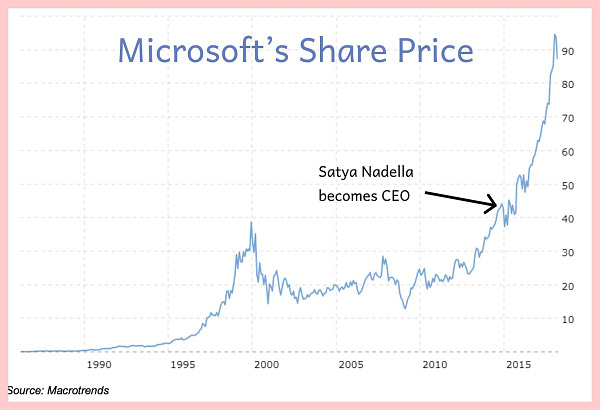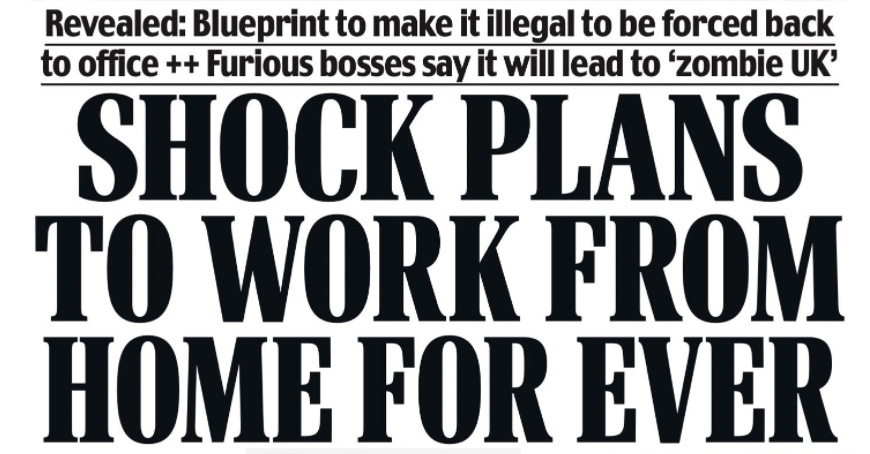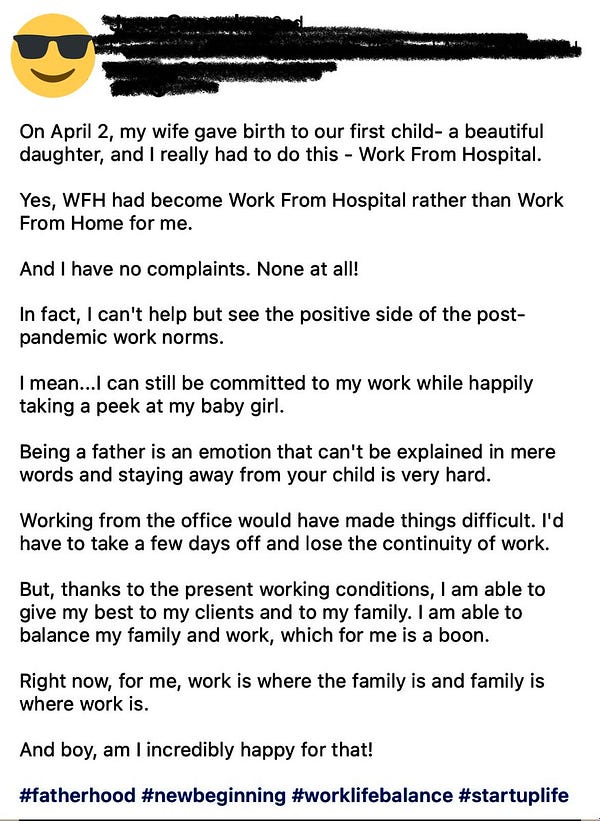Hybrid success is about letting go
ALSO: survey on the last year says we've worked longer, less productively
I had a stimulating discussion with former podcast guest Tom Ellis from Brand Genetics this week (you can see the video of it here, my sound is a bit tinny). In a wonderful discussion he referenced something that the boss of Unilever Alan Jope had said in an interview a few weeks ago:
‘We’re actually moving away from scenario planning and trying to focus on building agility and responsiveness into the company. And I don’t know that we should all be spending too much time locking in particular views or scenarios for the future, but rather unleashing the trapped capacity that most big organisations have by letting go and letting people close to the markets, close to the front line, exercise their judgment and their decision-making. We’ve discovered a new responsiveness in Unilever that I wish we had unlocked years ago, but it’s taken this crisis to do that.’
This really hit home. Not only had Tom just told me that his company had found that shifting from 2-day planning sessions to more regular, 3-hour sprints seemed to be more responsive and faster for their clients but also the discussion that I had with the Amazon executives a few weeks ago said exactly the same. Jeff Bezos had wanted to create leaders who were unshackled from the burden to communicate with other teams. Success in each case is in some order moving decision making closer to the point of execution - either by devolving it closer to the teams involved, or (in Tom’s case) by shifting the timing of it nearer to the moment of implementation.
It’s almost like treating all of our employees as our senses, able to feel, sense and detect what is going on - and then allowing them to do respond - might, shock horror, lead to better outcomes.
This is the fundamental challenge to every business and every leader right now. If the old way of working was to gather your team in the space around you and agree a plan with them of what they are do next, the new way of working needs to look different. If we are to make hybrid (or fully remote) working succeed then need to give clearer objectives to our workers and empower them with the autonomy to get them done. If the team are clear on what they need to accomplish and free to work out how to achieve those goals then engagement is the result. Workers themselves can see this, it’s why the employees we are hearing from are confused, ‘we’re getting on with this, what’s the problem?’ they seem to be asking.
In the meantime the persistent alternative argument is that we need to be in the office together for spontaneous moments of co-creation (as this NYT article explored and discredited this week - in-fact modern offices had already seen a 70% fall in face-to-face interactions). If there is something that being present together is better for it is moments of shared attention - here’s one paper that says our emotions are heightened when we experience them with people we like. (Obvious, yes, but a good reminder that if we want to create defining cultural events then these collective episodes of congregation are vital - in fact this research suggests so potent is the synchrony that our heartbeats started going in time with each other)
Of course this move to autonomy requires leaders to be strong and have faith in their teams. The demands for workers to come back where we can see them in time will be seen to be needy and anxious. The leaders who demand that employees need to be in the office all of the time reveal a great deal to us about their belief in other people’s honesty. (As Ben Folds said ‘It seems to me, if you can’t trust, you can’t be trusted’).
The challenge is that this next stage is hard. It requires that thing that we’re all striving for, innovation. It requires leaders to innovate on the way they manage. Sure, set stretching goals but then free workers up from admin demands to let them achieve them. This means fewer Zoom calls, fewer mandated days to be in the office, fewer report documents and slide-decks. In return firms will near clearer values, clearer job expectations, clearer rules and standards to deliver. This is why ultimately the debate about location will seem anachronistic very quickly. Firms who heed Jup’s advice will be trying to free their teams up to do jobs, and won’t care where they’re sitting to do it.
Hybrid ever after?
Is hybrid working going to become a legally protected right?
That’s an idea that one ‘Whitehall source’ tested on the Daily Mail last week. Sure enough, as the way with these ‘trial balloons’ a minister soon intervened to say it wasn’t an official plan just yet but it gives an indication that public policy makers are open to explore a number of options when it comes to what comes next. The upside to government could be the opportunity to reduce admin costs of the public sector by offloading some real estate. It comes as the property industry is trying to muddy the waters as office returns get planned - in one example here a real estate firm says that the number of companies reducing their footprint is small and getting smaller. The key bit of advice right now is that when you see a surprising news story about the return to work take a brief moment to check the source of it (see also: the story about 5 day office week’s coming back by next year. [paid for by city councils).
(Yes, well spotted, I was on GB News talking about this news article, with mixed feedback from the viewers. Mixed in the sense that not all of them believed hanging was too good for me).
‘My team feel like they don’t like each other any more,’ said an agency boss to me last week, explaining why he’s in a tricky spot. It gets worse, ‘We asked them to come back on Tuesday, Wednesday and Thursday and they’re very unhappy with the inflexibility of that. They’ve as good as said no. They’ve told us they don’t want rules,’ he explained. In the context of them feeling disconnected with colleagues the boss didn’t feel this was the moment to force compliance.
On the last newsletter I talked through the challenges of many firms (like Apple for example) who were finding that the ‘newly flexible’ rules that their senior leaders had hatched up had been proving very unpopular with employees. This isn’t stopping the businesses built on rigidly controlling their workers trying to leverage fear over them. ‘If you can go into a restaurant… you can come into the office,’ declared the boss of Morgan Stanley.
Just to be clear this fear-based approach cannot work in the long-term. (Also while commenting on someone’s appearance is lazy and inappropriate, I’ve always wondered, when leafing through luxury magazines, who the dead-eyed men in watch adverts were targeting? I think I’ve found him. This is the man who thinks a £50,000 watch is going to make his dead dad want to come back and hug him). Additionally what the Morgan Stanley boss is missing is the most fundamental understanding of what they actually teach in Exploitation 101. What he surely needs to understand that if his business model is to squeeze every drip of productivity out of young recruits desperately clammering to be promoted to the millionaire lounge then by allowing them to work from home they can do two hours more graft for him every day. But this is where the old rules most vividly don’t apply. Dude, you can still exploit the team remotely. It’s just that you won’t be able to stare at them while they’re doing it.
Zuckerberg says he’ll be at least 50% remote:
‘I’ve found that working remotely has given me more space for long-term thinking and helped me spend more time with my family, which has made me happier and more productive at work’
Facebook’s workplace update comes as Silicon Valley’s biggest companies are firming up office reopening plans, many of which include a combination of remote and in-office work. This has been backed up by Slack who have asked leaders to spend at least two days a week at home.
The Tech #Hustle BS hasn’t gone away

Twitter users may have seen this tweet draw a lot of heat last week. If you click through there’s a whole thread, including the revelation, ‘It didn’t come without costs. I gave myself pre-diabetes when working 90+ hour week in my early 20's. Suffered stress-induced IBS when my first startup went through ups and downs. I’m not saying it’s easy to live this way.
Cultural reinvention at MS
A wonderful Twitter thread about how Microsoft’s reinvention under Nadella was about culture. Click through, it explains how lots of changed incentives (that might not get your immediate attention) helped reorientate the firm. (If you like this, you may also like this, of course)


Venture capital fund a16z surveyed 216 CEOs of start-ups in their portfolio, ‘about ⅔ of organisations said they would work in a “hybrid model,” with the majority of those opting to be in the office 1-2 days per week (38.8%) or in person only for offsites (28.6%)’
Not surprising to see the revelations at Brewdog, but what it does show is that if you’ve got a toxic bullying culture increasingly there’s a risk it’s going to become a news story'
What does surprise me is how easily firms can manage these stories by throwing a distraction to the press - in this case they announce an inquiry hoping it just all goes away. In the case of Deloitte a few weeks ago the company was in the press for a bullying boss demanding staff attend early meetings and creating an intimidating climate, Deloitte announced the boss was ‘stepping down’ - but she’s still at the company and her LinkedIn still lists the ‘People & Purpose’ title she’s meant to have stood down from. PR lesson: bad story? throw the press a bone and hope it goes away
I’ve worked with two organisations in the last few months who have secretly dealt with a ransomware issue - don’t believe that it might just happen to someone else. Here’s infosec writer Kim Zetter on how to respond
WeWork recorded their best desk rentals since September 2019, they well end up as a good barometer of market expansion in the months to come
A new study on WFH released this month suggests that total hours worked goes up 30% but total output doesn’t change - meaning productivity falls by about 20% - the secret for for every firm is cracking this overworking issue
The Atlantic wrote a good summary of the case for us taking this moment to switch to a 4-day week (again, I’ve done 2 podcasts on this if you’re tempted)
The Joy of Work remains at 99p for what’s left of June. As your attorney I’m telling you not to read it on holiday, you’ve thought enough about work this year

If you’re new here you might find these resources come in handy:
Which meetings on which days? Think about convergent vs divergent modalities
If you're interested in reading a book to support your interest in workplace culture? I've updated my list of favourite titles
Photo by Jonas Jacobsson on Unsplash










